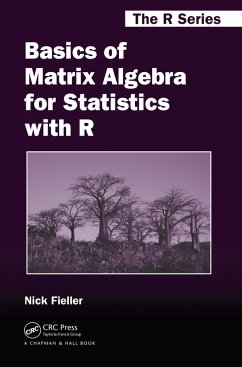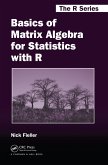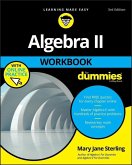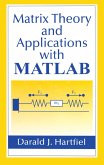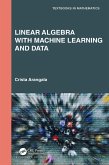Dieser Download kann aus rechtlichen Gründen nur mit Rechnungsadresse in A, B, BG, CY, CZ, D, DK, EW, E, FIN, F, GR, HR, H, IRL, I, LT, L, LR, M, NL, PL, P, R, S, SLO, SK ausgeliefert werden.
Hinweis: Dieser Artikel kann nur an eine deutsche Lieferadresse ausgeliefert werden.
-Abdolvahab Khademi, University of Massachusetts, Journal of Statistical Software, July 2016
"Key features of the book include highlighting useful tricks when manipulating matrices, derivation of key results with step-by-step cross-referenced explanations and demonstrations of implementing the techniques in R using numerical examples...it is a good beginner's guide to understanding and manipulating matrices in R. It is suitable for early year undergraduate students and anyone who wishes to be introduced to matrix algebra in R in preparation for high-level or specialised studies in statistics. The book's collection of summaries and key results also make it a good handbook for any statistician to refer to."
-Shuangzhe Liu, Stastistical Papers, July 2016
"... a concise and straightforward presentation of matrix algebra techniques that are commonly used in statistics. Furthermore, the book discusses how to implement numerical instances of these techniques using R. ... If you have a need or desire to carry out matrix computations in R, then it is likely that here you will find the needed commands. There are several nice features ... it is very easy to find the R command for carrying out a specific matrix calculation. ... useful as a reference. In addition, the author provides helpful tips and tricks for working with R. Another positive feature of this book is the applications to statistics. ... the inclusion of exercises facilitates the use of this book as a course text."
-MAA Reviews, January 2016

